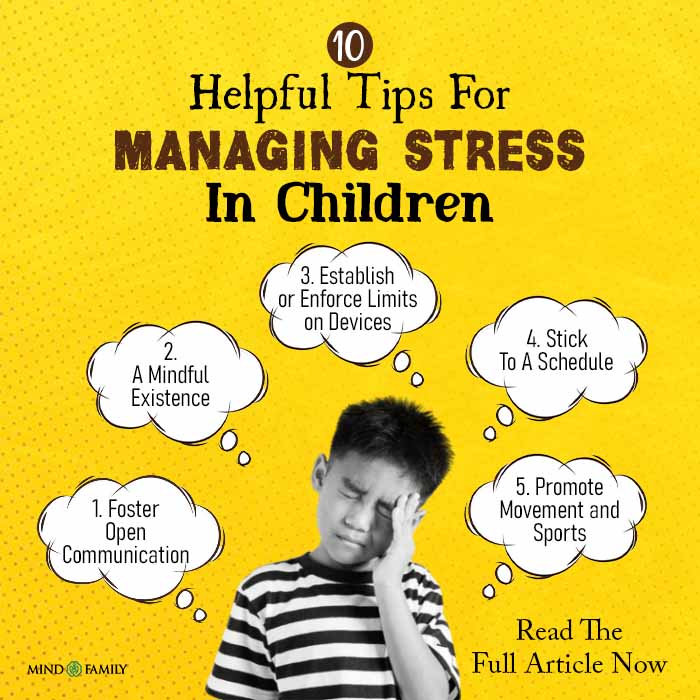As parents, it’s crucial for us to recognize the signs of stress in our children and provide the tools they need to cope.
The good news? We can help. By creating a supportive environment and teaching managing stress in children healthily, we can significantly reduce the stress they feel.
In this article, we’ll explore ten practical tips to help you in dealing with stress in kids, while fostering emotional resilience and a sense of security.
Together, we can ensure our kids grow up equipped to handle life’s challenges with confidence and calmness. Let’s dive in!
10 Helpful Tips For Managing Stress In Children

1. Encourage Open Communication
We need to create a safe space where our kids feel comfortable talking about their feelings. Managing stress in children encourages them to share their thoughts, fears, and frustrations, no matter how small they may seem.
Let them know that it’s okay to feel upset, angry, or scared, and that you’re there to listen. Often, just expressing their emotions helps children feel relieved and less burdened.
We can also ask open-ended questions like, “How are you feeling today?” or “What’s on your mind?” Remember, communication is a two-way street—listening without interrupting is just as important as speaking.
2. Practice Mindfulness Together
Mindfulness is a fantastic way to help children stay present and reduce anxiety. Introducing simple breathing exercises or mindfulness activities into daily routines can have a calming effect.
Start with a few minutes each day where you and your child sit quietly, focusing on breathing slowly in and out. For younger children, you can turn mindfulness into a playful game—like pretending to blow up a big balloon with slow, deep breaths.
You can also incorporate mindfulness as a way of managing stress in children into everyday activities like eating or walking by asking your child to notice how things look, feel, and taste.
Practicing mindfulness together not only helps reduce stress but also strengthens the bond between you and your child. It teaches them to slow down and be present, helping to manage overwhelming emotions.
3. Limit Screen Time
We know how easy it is to hand over a device when things get hectic. However, too much screen time can heighten stress levels, especially with the constant stream of information from social media, games, and online content.
It’s easy for children to get overstimulated or feel pressure to keep up with online trends and friends. We can set healthy screen limits by creating tech-free zones, like during meals or an hour before bedtime, to help them unwind.
When children have a balanced relationship with technology, they are less likely to experience screen-induced stress, making it easier for them to relax and focus on real-world interactions.
Read More: How To Manage Screen Time For Teens: 10 Helpful Tips For Parents!
4. Maintain a Routine
Kids thrive on routine. Having a predictable daily structure provides children with a sense of security, especially during times of uncertainty or change. Regular routines help kids know what to expect, thus managing stress in children in a healthy way.
Try to maintain consistent mealtimes, bedtimes, and study times, even on weekends or during vacations. This predictability makes transitions smoother and helps children feel more in control of their environment.
In addition to keeping a routine for the essentials, we can also introduce fun family rituals, like Friday movie nights or Sunday morning walks, to create a rhythm that our children can look forward to.
5. Encourage Physical Activity

Physical exercise is a natural stress reliever, and it’s fun too! Regular physical activity helps release endorphins, the body’s feel-good chemicals, which naturally reduce stress and boost mood.
Find activities your child enjoys, whether it’s dancing, swimming, playing sports, or even running around the backyard. You don’t have to make it a formal exercise session—turn it into a family game of tag or a friendly race.
Physical activity is crucial for managing stress in children as it also promotes better sleep, which is crucial for managing stress.
By incorporating exercise into daily life, we not only help our kids stay physically healthy but also support their emotional well-being.
Read More: How to Build a Family Exercise Routine: 8 Essential Tips For Your Family!
6. Teach Problem-Solving Skills
Stress often comes from not knowing how to handle challenges. By teaching our kids problem-solving skills, we empower them to manage difficulties with confidence.
When managing stress in children, start by helping your child identify the issue at hand—whether it’s a conflict with a friend, a school assignment, or an overwhelming task.
Then, brainstorm solutions together, guiding them to think through the pros and cons of each option.
Encourage them to try out different solutions, reminding them that mistakes are part of the learning process. Over time, they’ll build resilience and learn to handle challenges independently.
Teaching problem-solving is about giving children the tools they need to approach life’s difficulties with a positive, solution-oriented mindset, reducing their feelings of helplessness and stress.
7. Be a Good Role Model
Children look to us for cues on how to handle stress. If we manage our stress in healthy ways—whether it’s taking a break, practising deep breathing, or talking through our feelings—they’ll learn to do the same.
When you’re feeling stressed, try to model calm, constructive coping mechanisms in front of your child. Managing stress in children is also about the example you set as well.
Talk openly about your own emotions when appropriate, so they understand that stress is a normal part of life, but one that can be managed.
For example, if you’re overwhelmed with work, you might say, “I’m feeling a bit stressed right now, so I’m going to take a few deep breaths.” This not only shows them how to manage stress but also reinforces that it’s okay to talk about feelings.
8. Encourage Creativity For Dealing With Stress In Kids
Creative outlets, like drawing, writing, or playing music, can be great stress relievers. Encourage your child to explore their creativity as a way to express their emotions.
You can provide them with simple tools—coloring books, art supplies, or even an old notebook—to let their imagination run wild.
Not only does engaging in creative activities help in managing stress in children , but it also offers a productive distraction from stressful thoughts. We can also join in and make creativity a family affair, whether it’s crafting together or writing stories as a group.
Encouraging creative expression allows children to release pent-up energy and emotions in a positive, non-verbal way, helping to reduce stress and anxiety.
9. Foster Positive Social Connections

Strong, supportive friendships can help buffer against stress. Encourage your child to develop and maintain healthy relationships with friends, and if possible, create opportunities for them to spend time with peers.
You could even plan playdates or group activities to help them bond with others. In cases where your child is feeling isolated or struggling socially, it’s essential to gently encourage them to talk about their concerns and help them find ways to build meaningful connections.
This could involve role-playing social scenarios at home or guiding them toward extracurricular activities where they can meet like-minded peers.
Building positive social connections fosters a sense of belonging and emotional support, which is essential for stress relief.
10. Don’t Forget Downtime
Life can get busy, but it’s crucial to carve out time for rest and relaxation. Downtime allows children to recharge both mentally and physically. It is one of the most effective ways for managing stress in children.
Ensure your child has enough unstructured time to relax, play, or daydream, without the pressure of schoolwork, chores, or other responsibilities. This helps reduce dealing with stress in kids and improves their health.
We can also make downtime more relaxing by creating a calm environment—dim the lights, play soothing music, or introduce calming activities like reading a book together.
Taking regular breaks throughout the day helps children manage their stress and gives their minds a chance to rest. Let’s remember that just like adults, kids need time to unwind and relax in their own way.
Read More: 7 Interesting Ways Parents Can Entertain Kids And Keep Boredom At Bay
A Word From Mind Family
At Mind Family, we understand that parenting in today’s fast-paced world can be overwhelming, and dealing with stress in kids can feel like an uphill battle.
However, as we’ve discussed, there are simple, practical steps we can take to ease their worries and teach them healthy coping mechanisms.
Parenting may not come with a manual, but together, we can create a more peaceful, balanced experience for both ourselves and our children.
Your journey as a parent is unique, and at Mind Family, we’re here to support you every step of the way. Let’s continue learning, growing, and building stronger, happier families.
Frequently Asked Questions (FAQs)
1. How can I help in dealing with stress in kids?
Encourage open communication, practice mindfulness, limit screen time, maintain routines, and promote physical activity to help your child manage stress effectively.
2. What are the signs of stress in children?
Signs include mood swings, irritability, sleep issues, trouble concentrating, or withdrawing from activities they usually enjoy. Look for changes in behavior and routines.
3. How does mindfulness help reduce stress in children?
Mindfulness teaches children to stay present, focus on their breathing, and calm their mind, helping to reduce anxiety and improve emotional regulation.












Leave a Reply